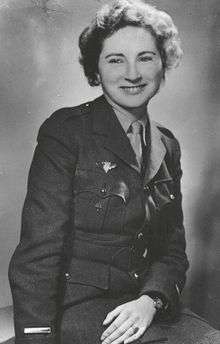Tereska Torrès
| Tereska Torrès | |
|---|---|
 | |
| Born |
Tereska Szwarc 3 September, 1920 Paris |
| Died |
20 September, 2012 Paris |
| Nationality | France |
| Occupation | writer |
| Spouse(s) |
Georges Torrès Meyer Levin |
| Parent(s) | Guina and Marek Szwarc |
Tereska Torrès (3 September 1920 – 20 September 2012)[1] was a French writer. She is credited with writing the first pulp to candidly address lesbian relationships in America. However Torres felt that the book was relatively innocent and she had been exploited.[2]
Life
Torrès was born Tereska Szwarc to the Jewish Polish sculptor Marek Szwarc and his wife Guina in Paris. She had to flee her native country in 1940 via Lisbon to England when France surrendered to Nazi Germany after the Battle of France,[3] while her father, serving in the Polish Armed Forces in the West, was evacuated from La Rochelle by the British Home Fleet. Her family was able to escape because they received visas signed by Vice-Consul Manuel Vieira Braga (following instructions from Aristides de Sousa Mendes) in Bayonne, France in June 1940.[4]
At the age of 19 Torrès enlisted in Charles de Gaulle's Free French Forces Volontaires Françaises Corps and worked as a secretary in de Gaulle's headquarters in London.[5] In October 1944 when she was five months pregnant, her first husband 20-year-old Georges Torrès, stepson of pre-war French-Jewish Prime Minister Léon Blum, was killed while fighting with the 2nd Free French Armoured Division in Lorraine.[6]
In 1947 Torrès accompanied American novelist Meyer Levin while he filmed the documentary Al Tafhidunu (The Illegals) about Jewish refugees who fled Poland after the Holocaust and tried to reach Palestine.[7] Her diary about her experiences on this journey from Poland's destroyed cities through the displaced persons camps in Western Europe to Israel and her imprisonment there by British Forces were published so far only in German as Unerschrocken (Unafraid).[8]
In 1948 Torrès married Meyer Levin in Paris. He urged her to publish the diary she wrote while serving in the Free French Forces. In 1950 Torrès published in the United States a fictional account of her wartime experiences under the title Women's Barracks, which "quickly became the first paperback original bestseller" selling over 2 million copies in its first five years,[7] as it was the first pulp to candidly address lesbian relationships. In total 4 million copies of the book were sold in the United States and it was translated into 13 different languages. In 1952 Women's Barracks was selected as an example of how paperback books were promoting moral degeneracy, by the House Select Committee on Current Pornographic Materials.[9] When the book was republished by The Feminist Press in New York in 2003, it was acclaimed as having inspired a whole new genre of lesbian and feminist writing in the US.[10]
Torrès did not allow Women's Barracks to be published in France. Instead her wartime diary was published as Une Française Libre. She is credited with writing the first pulp to candidly address lesbian relationships in America. However Torres felt that the book was innocent and she had been exploited by her publishers.[2]
In 1963, Torrès accompanied Levin to Ethiopia, where he filmed "the Fellashas" which was the first documentary about the life of Beta Israel Jews in Ambover.
Torrès wrote some further 14 books, which were often translated by her husband into English.[5] Her best known books are:
- Le Sable et L'écume – 1945 by Gallimard. Her first novel started when she was 17 years old and finished during the war.
- Women's Barracks – 1950 by Fawcett's Gold Medal; the first Lesbian pulp novel.
- The Converts – 1970 by Knopf (New York); an account of her childhood and youth.
- Les Poupées de Cendre – 1972 by Éditions du Seuil et Éditions Phébus; a novel set in Israel.
- Les Maisons Hantées de Meyer Levin – 1974 by Éditions Phébus (Paris); about her husband's 30-year-long obsession with a play he wrote based on the Diary of Anne Frank.
- Une Française Libre – 2000 by Phebus (London); a diary of her war years.
- Le Choix – 2002 by Edition Desclée de Brouwer (Paris); about her parents' secret conversion to Catholicism in 1919.
Her still unpublished diary notebooks are preserved by Boston University.[11]
She was one of a few surviving members of the "Volontaires françaises" – the women's army corps of the Free French Forces.[12]
References
- ↑ Fox, Margalit (24 September 2012), "Tereska Torrès, 92, Writer Of Lesbian Fiction, Dies", The New York Times, retrieved 25 September 2012
- 1 2 "Tereska Torrès". The Daily Telegraph. London. 25 September 2012. Retrieved 25 September 2012.
- ↑ Marek Szwarc Biography, archived from the original on 8 October 2007, retrieved 16 December 2007
- ↑ "Pinkus/Szwarc » Sousa Mendes Foundation". sousamendesfoundation.org. 2012. Archived from the original on 15 April 2013. Retrieved 30 September 2012.
- 1 2 "Women's Barracks", Powell's Books bookstore, retrieved 16 December 2007
- ↑ "Torrès » Sousa Mendes Foundation". sousamendesfoundation.org. 2012. Retrieved 30 September 2012.
- 1 2 Smallwood, Christine (2005-08-09). "Sapphic soldiers". Salon. Retrieved 2018-09-01.
- ↑ "The Illegals", Jewish Film Week, archived from the original on 19 October 2007, retrieved 16 December 2007
- ↑ Theophano, Teresa (2002), "Pulp Paperbacks and Their Covers", glbtq.com, archived from the original on 5 November 2007
- ↑ Lichfield, John (16 June 2007), "O! What A Steamy War", The Independent, archived from the original on 3 February 2008, retrieved 16 December 2007
- ↑ "Levin, Meyer -(1905-1981)". Howard Gotlieb Archival Research Center. Boston University. Retrieved September 1, 2018.
- ↑ Kirby, Emma-Jane (15 December 2007). "Ladies of the French Resistance". BBC News. Retrieved 17 December 2007.